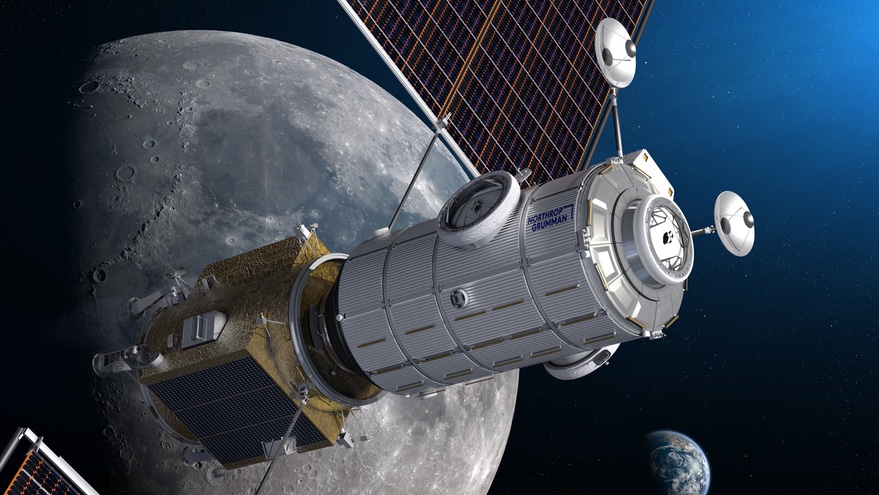WASHINGTON — NASA has awarded a contract worth $935 million to Northrop Grumman to build and integrate the first habitation module for the lunar Gateway.
NASA announced July 9 it finalized a contract with Northrop Grumman to build the Habitation and Logistics Outpost (HALO) module for the Gateway. That module, one of the first for the Gateway, will serve as a habitat for visiting astronauts and a command post for the lunar orbiting facility. It will have docking ports for Orion spacecraft, cargo vehicles like SpaceX’s Dragon XL and lunar landers, as well as for later modules to be added by international partners.
HALO is based on the Cygnus spacecraft that Northrop Grumman uses to transport cargo to the International Space Station, but extensively modified with docking ports, enhanced life support and other new subsystems. “By leveraging our active Cygnus production line, Northrop Grumman can uniquely provide an affordable and reliable HALO module in the time frame needed to support NASA’s Artemis program,” said Steve Krein, vice president of civil and commercial satellites at Northrop Grumman, in a company statement.
The fixed-firm-price contract covers assembly of HALO as well as integrating it with another Gateway module, the Maxar-built Power and Propulsion Element (PPE). Northrop will also be responsible under the contract for preparing the combined modules for launch on a SpaceX Falcon Heavy, as well as activation and checkout of HALO after launch.
“This action puts in place the final contract component of a diverse, multifaceted team — distributed across the country and within some international partner facilities — working together to create and implement the initial Gateway capability,” Jon Olansen, NASA manager of the HALO project, said in an agency statement.
NASA has been engaged with Northrop Grumman on HALO for nearly two years under a series of contracts worth more than $1.1 billion. In July 2019, NASA stated in a procurement filing that it would issue a sole-source contract to Northrop Grumman for a habitation module based on work the company did under a Next Space Technologies for Exploration Partnerships (NextSTEP) award dating back to 2016. Northrop Grumman was one of six companies that received NextSTEP awards for studies of habitation modules, but NASA concluded that Northrop was the only one whose design would be ready to meet the 2024 deadline set in March 2019 for returning humans to the surface of the moon.
NASA then issued a $187 million contract in June 2020 to cover work on HALO through the preliminary design review. That review, at the time of the contract announcement, was scheduled for the end of 2020 but did not take place until May.
Over the last two years the plans for the Gateway have changed. NASA originally proposed launching the PPE and HALO separately, then docking them in the near-rectilinear orbit the Gateway will use. In 2020, though, NASA changed course and concluded combining the two elements on the ground and launching them on a single vehicle would save the cost of a single launch as well as reduce complexity.
Those changing plans, though, have created cost increases and technical issues for the Gateway, according to a report by NASA’s Office of Inspector General in November 2020. It also warned that, with a launch no earlier than May 2024, the PPE and HALO would not be in position to support an Artemis 3 lunar landing mission, if that mission held to a 2024 schedule as the agency planned at the time.
The launch of the Gateway modules has slipped further. In the NASA announcement of the contract, the agency said that the PPE and HALO would launch on a Falcon Heavy in November 2024. NASA has not updated the schedule for the Artemis 3 mission, and the agency previously stated that the Orion spacecraft could dock directly with the lunar lander — SpaceX’s Starship, if NASA’s contract awarded in April withstands protests filed with the Government Accountability Office — in the near-rectilinear halo orbit, rather than use the Gateway.
However, the agency continues to expect to use the Gateway as a staging area for future lunar lander missions as part of the later, “sustainable” phase of lunar exploration. “NASA is building the infrastructure to expand human exploration further out into the solar system than ever before, including Gateway, the lunar space station that will help us make inspirational scientific discoveries at and around the moon,” NASA Administrator Bill Nelson said in the statement. “The HALO is a critical component of Gateway, and this exciting announcement today brings us one step closer to landing American boots on both the moon and Mars.”
